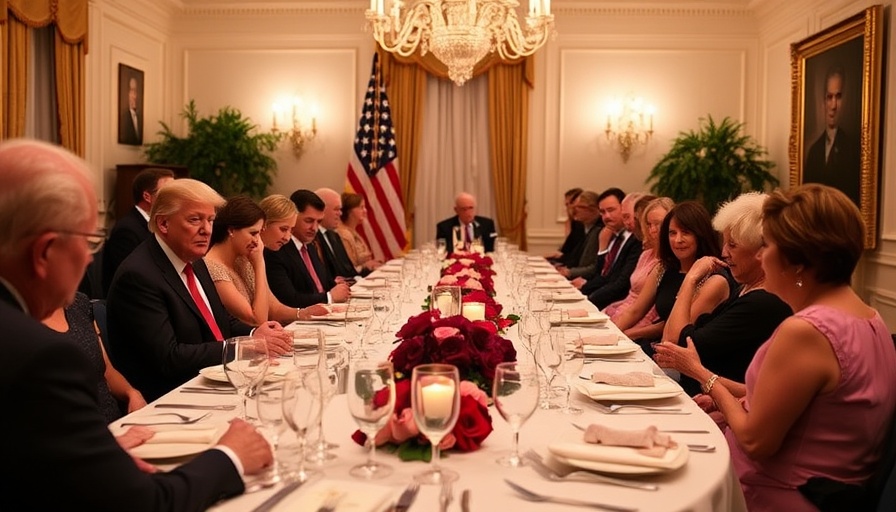
Trump's $200 Million Ballroom Proposal: A Closer Look
In a controversial move, President Trump's recent dinner for influential donors at the White House has raised eyebrows and ethical questions. The extravagant event, aimed at raising funds for a new 90,000-square-foot ballroom addition, attracted business magnates from companies like Amazon, Google, and Apple. However, critics suggest this initiative may blur the lines between public service and private interests.
Pay to Play: Unpacking the Ethics
Guests at the dinner included billionaire supporters and corporate executives who have significantly contributed to Trump's political endeavors. Richard W. Painter, a former ethics lawyer in the Bush administration, criticized the event, stating it represented “pay to play” dynamics. The concern here lies not just in the act of fundraising but in the access and influence these contributions may afford wealthy donors regarding policy decisions and government actions.
The Need for a Modern Space
Despite the criticisms, Trump and his administration argue that the proposed ballroom is essential. “American presidents need to be able to showcase our country,” Trump asserted. The current arrangements for hosting events often result in tents on the South Lawn, bringing complications and limitations. Advocates for the ballroom emphasize that this infrastructure upgrade would enhance diplomatic engagements and showcase American hospitality.
The Vision Behind the Ballroom
During the dinner, Trump elaborated on his vision for the ballroom, showing models that included features like bulletproof windows and a capacity for nearly 1,000 guests. The project is not merely about space; it symbolizes a desire for grandeur and serves to further establish his brand of leadership that mixes glamour with politics.
Questions that Demand Answers
The contours of this proposal bring forth a multitude of questions. Will the project indeed be funded solely by donors, or will taxpayers find their way into the funding equation? What accountability measures are in place to ensure transparency? As discussions about conflicts of interest continue, understanding the real implications of this initiative becomes paramount for citizens across the nation.
Future Implications of Fundraising Practices
The dinner shines a light on a broader issue within American politics: the role of money and fundraising in governance. As Trump's presidency unfolds, this situation might influence future fundraising dynamics, leading to increased scrutiny over donor influence in political arenas. Americans may find themselves asking critical questions about ethical governance and the power of wealth in shaping policy decisions.
Analyzing Public Perception
Public sentiment regarding Trump's ballroom ambitions appears deeply divided. For some, it’s an emblem of decadence and disregard for everyday Americans struggling with economic challenges. For others, it symbolizes a beautiful vision of state, reinforcing Trump's appeal as a strong leader. Understanding this duality in perception will be crucial for evaluating the political capital the president stands to gain from such high-profile events.
As the ballroom project progresses, one thing is clear: Americans will be watching closely. With fundamental questions of ethics, transparency, and governance at the forefront, these fundraising dinners will likely shape the narrative of political engagement in contemporary America.
In this evolving landscape of political fundraising, it is essential for citizens to stay informed and engage in discourse surrounding these developments.
 Add Row
Add Row  Add
Add 




Write A Comment